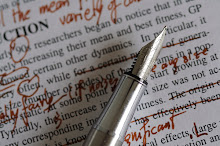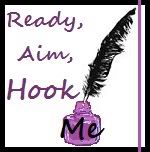I’m getting ready to revise. Shoot me now. No, actually, if I get my mind in the right place, I welcome revision. It’s challenging and eye opening. There are many times when I’ll laugh or roll my eyes at some awkward sentence or stupid stretch of dialogue. But that’s okay. Like Angela said in her post on Monday, we have to allow ourselves to write crappy first drafts. If we get caught up with perfection we could lose out on something great. Just get ‘er done and worry about it later.
The best part of revision is getting wrapped up in the emotions all over again and taking them to a whole different level. But before we jump back into our story we need a bit of distance. Use the time to start a new project, catch up on blogs, twitter, or giving your family a bit of lovin’. Do anything but touch your finished ’script.
After I’ve had time away, and before I print off a hard copy, I do a search for all my clutter. The words and phrases that are useless and can be deleted without changing the sentences too much. The reason I do this now is getting rid of some of the fat helps me focus on the story. I stay out of edit mode. Actually, they say writing and editing use different sides of the brain. So it’s important to either write or edit, but not bounce back and forth. If you’re interested in what words and phrases I search and destroy, look for an upcoming post Biggest Loser: Manuscript Edition.
Okay, so I’ve de-cluttered a bit, now it’s time to print off a hardcopy and get to work. Not only do you need a break, but your eyes need a rest from the computer screen. It’s amazing what you’ll pick up in hardcopy. This is a great opportunity to change the font too. Do whatever you can to get a fresher viewpoint.
Read through your manuscript as quickly as you can, resisting any and all urges to edit. Take notes, ask yourself questions as you read. Use this opportunity to be a reader. Does the story make sense? Is there enough conflict? Are the characters believable and likeable? Are there plot holes? Does every scene propel the MC forward? Yada yada yada.
When I’m all done with my first run through, it’s time to get back in writing mode. This is the time to experience it all over again, only this time your job is to enrich it, go deeper. Make sure that your reader forgets he’s reading. There are two concepts I read about in July/August Writer’s Digest that I think help in the revision process: overwriting and finding the telling details.
Overwriting is basically just that. Let’s say you have a scene you’re reluctant to tank but it lacks something. Murdering your darlings is not easy; so, rather than slicing and dicing just yet spend some time, I think the article said ten minutes, and write as much as you can without stopping, adding as much new material as you can. Don’t filter yourself—just write.
Most of this you won’t use, but within that ten-minute chunk of writing you may come across a gold nugget, some detail that makes it better than before. Sift through it and keep what works and get rid of what doesn’t.
The other concept is the Telling Detail. This isn’t telling vs. showing. This is that one detail that brings your character to life or makes a scene unforgettable. Think of one of your favorite books. Was there any one thing that told you everything you needed to know about a character without saying x, y, & z?
In one of my writing lectures, one of the speakers elaborated about the importance of characterization. She shared an example from a suspense novel. Two characters sitting in an office. One was a cop and the other wasn’t. The civilian noticed deep grooves in the detective’s glasses and went on to describe them. Then sometime later, we see this cop at a crime scene, crouched over the body of a murdered woman with the earpiece locked in his teeth. Sure this answers a question as to where the grooves came from but it’s also one of those details that stirs up questions and keep us turning the pages.
Do you have any tips or tricks to enrich your writing at the revision stage?
"You write to communicate to the hearts and minds of others what's burning inside you. And we edit to let the fire show through the smoke.” ~ Arthur Polotnik
Thanks for looking,
The Skeptical Hook'er








2 comments:
I love the idea of "overwriting" during the editing process. I do something similar to overcome writer's block (I call it word vomit) but I never thought of using it when editing.
Thanks for another great post!
Charlotte
Word vomit. Love it. I do that in everyday conversation. ;)
Post a Comment